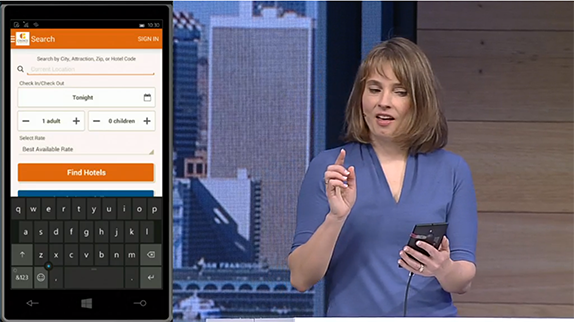In a surprising move, Microsoft is now letting developers repackage their Android and iOS apps for Windows 10. Developers will be able to quickly port their app over, with equivalent system-level APIs in Windows that will support as well as extend the app’s functionality. Microsoft will include an Android subsystem on Windows 10 for phones and have supporting APIs for iOS apps. The above image is a demo of an Android app, accessing Windows phone’s native controls and APIs, but the remaining code is the same. This way, it drastically cuts down development costs which companies just can’t afford, to re-write for a platform without substantial market share.
This is similar to the strategy which Blackberry adopted, but this is also similar to what Google adopted, when Android wasn’t getting apps from iOS. They made porting easier, and that’s what Blackberry then, and Microsoft now, have done. Android developers will be able to code Android apps using Visual Studio and re-compile it, with Windows 10-specific APIs in a short time, so they can launch on all platforms at once. Most developers these days rely only on Android and iOS. This is very similar to the work Nokia did for the Nokia X, which might have played a role here too. Navigation in the UI is now more similar, and even the desktop gets the all-important back button for letting them be universal apps.
King’s Candy Crush Saga was shown as an example of an iOS game ported to Windows Phone without many modifications. Microsoft is basically virtualizing these apps in its operating system, a common method adopted for this approach. These solutions are part of the new SDKs that will aim to attract developer interest to the dwindling platform, that is Windows. The possibility of developers porting to Windows Phone is now higher, but will it bridge the mobile industry gap to at least some extent? It certainly didn’t work out for Blackberry or Amazon, but Microsoft has a decently talented hardware division at its disposal, which, we hope, creates possibilities, may be? Sound off your opinions in the comments section below.

